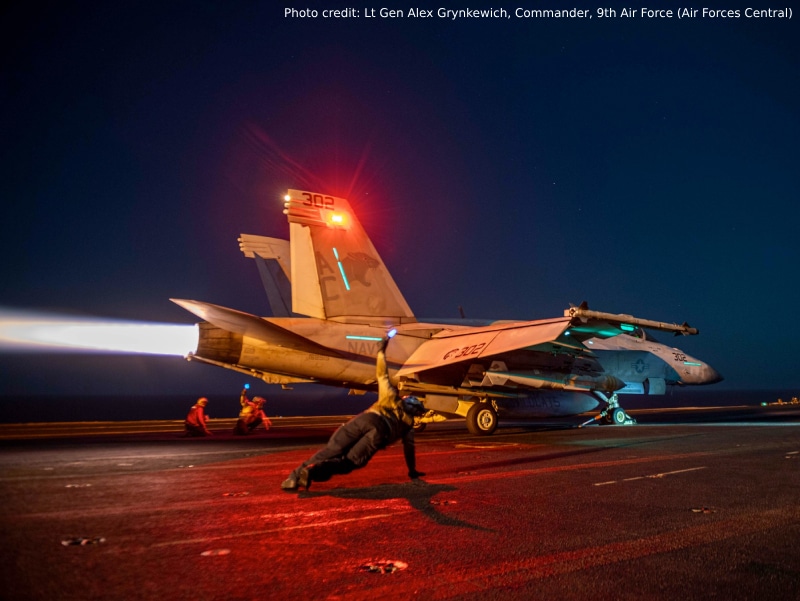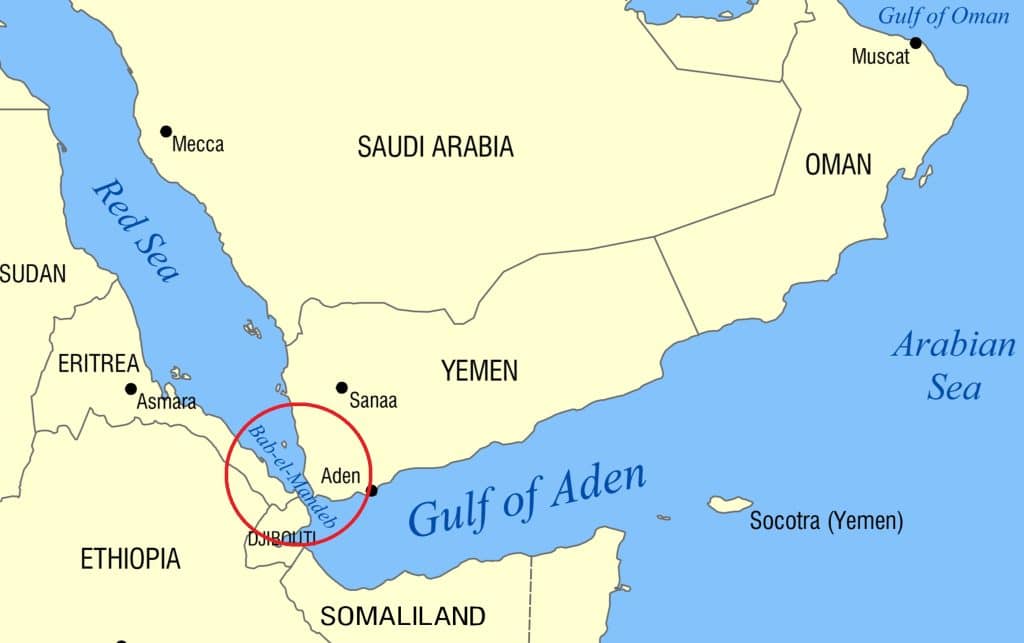
Tensions in the Red Sea have not subsided since November 19th of last year, when the Houthi movement, also known as Ansar Allah, began attacks on commercial ships passing through the Bab el Mandeb strait towards the Suez Canal. This transit route is one of the most significant maritime routes, serving as a unique maritime corridor linking the Arabian and the Mediterranean Seas. Yemeni Houthi members first attacked the cargo ship Galaxy Leader during its voyage through the southern waters of the Red Sea, taking the crew hostage and redirecting the ship to the port of Hodeidah under their control. Shortly after this event, Houthi leaders announced that the aim of their attacks was primarily to exert pressure to end hostilities in the Gaza Strip, in response to the actions of the State of Israel and its armed forces. The escalation of tensions in this region, coupled with the situation in Israel, is causing additional concern, particularly considering that over the past three months, at least 36 commercial ships have been targeted by the Houthi movement. As a result, not only has there been disruption to global trade flows, but potentially to the entire global economy, as this maritime corridor accounted for between 12% and 15% of global trade throughout the 2023.
The Bab el Mandeb strait is a crucial point for the trade of oil and natural gas. During the first half of last year alone, 12% of oil trade conducted by sea and 8% of liquid natural gas (LNG) trade passed through this passage. However, the increasing attacks on commercial ships have led numerous companies to suspend or completely halt navigation through the Red Sea. As a result, the transport of refined oil products through this maritime corridor was already 30% lower in December than the rest of 2023, with estimates from the United Nations Conference on Trade and Development (UNCTAD) indicating a 42% decrease in trade volume through this transit route in December and January. Nevertheless, in search of a solution for uninterrupted and secure transport, some companies such as Hapag-Lloyd and Maersk have opted to take alternative, albeit much longer and more expensive routes around the southern tip of Africa, Cape of Good Hope, leading not only to delays in cargo delivery, but also increased transportation costs.
In response, the United States initiated Operation Prosperity Guardian on December 18th as part of a multinational security initiative to collectively address security challenges, risks, and threats in the southern Red Sea and the Gulf of Aden. Less than a month later, on January 11th, the United States Central Command launched an operation codenamed Poseidon Archer in direct response to the Houthi attacks, with the primary objective being to diminish the military capabilities and capacities of the Houthis. This operation involved a series of airstrikes targeting ground targets located in parts of Yemen controlled by the movement. However, despite these strikes, the Houthi movement not only continued its attacks on ships in the Red Sea but also appears to have garnered more attention on the international stage, along with an opportunity to further strengthen its influence in Yemen and the region. Specifically, the Houthis exploited Israel's military operations in the Gaza Strip as a pretext for their attacks, which not only gained them support from the local population but also from the regional public, primarily in Arab states. Therefore, despite multiple airstrikes, they continue to carry out attacks on the remaining commercial ships still navigating this maritime route. On the other hand, coalition forces led by the United States successfully intercept Houthi ballistic missiles and drones almost daily, contributing to an increase in the level of security in the region to some extent. However, despite this, it is difficult to assess the ultimate success of the entire operation, as it does not imply only a partial increase in navigation security but a complete cessation of Houthi attacks.

Given that the military potential and weaponry available to the Houthis are incomparable to the international coalition led by the United States, questions arise regarding the cost-effectiveness of Operation Prosperity Guardian. For instance, to shoot down rockets and inexpensive Houthi drones worth a few thousand dollars, significantly more expensive and advanced American missiles are used, some of which cost several million dollars each. If the current pace of Houthi attacks on ships in the Red Sea continues, the costs incurred by the Pentagon could quickly reach several billion dollars in just a few months. Additionally, one must consider the costs of American presence in various parts of the world, as well as aid to Ukraine and Israel, which could potentially negatively affect public opinion in the US, especially considering the upcoming presidential elections in the country. Furthermore, it seems that even the White House is not prepared for more concrete military presence on the ground (which could potentially last for months), and engaging in direct conflict would also entail a significant departure from already established foreign policy of the Biden administration, particularly concerning the achievement of peace between Yemen and Saudi Arabia.
Effectively countering the Houthis is also complicated by their decentralized structure, as there is no single target or strategically significant asset whose destruction could completely undermine the military capabilities of the Yemeni Houthis. Moreover, coalition airstrikes fail to achieve desired objectives partly due to the fact that supply lines and arms deliveries from Iran have not been interrupted. Any potential attempt to prevent weapon shipments could escalate into direct conflict involving official Tehran, which is currently considered an undesirable scenario for both official Washington and other Western countries. Ultimately, even reinstating the Houthi movement on the list of foreign terrorist organizations would not achieve significant goals, as Houthi leaders have been on this list before. However, such a move would negatively impact the already challenging delivery of humanitarian aid to Yemen, a country that according to the United Nations High Commissioner for Refugees, is facing one of the world's largest humanitarian crises.
Additionally, it is important to note the absence of public and unequivocal support for Washington's actions from most Middle Eastern partners, as public opinion in the Arab states tends to lean towards the Houthis, primarily because members of this movement have tied their attacks exclusively to support for the Palestinian people in the Gaza Strip. On the other hand, the United Arab Emirates have lobbied for the reinstatement of the Houthi movement on the list of foreign terrorist organizations, which could also be interpreted as the Gulf country's readiness to fight for its presence and influence in Yemen without direct conflict. Furthermore, Saudi Arabia does not seem willing to reignite its years-long conflict with the Houthis in Yemen but instead wishes to continue peace negotiations. The ceasefire agreement from 2022 has held up to this day, with the two sides never being closer to an agreement that would make the current ceasefire permanent. After all the losses and billions of dollars spent, it is unlikely that Saudi Arabia would engage in armed conflict again, which, after years of fighting, instead of defeating the Houthis, resulted in the partial legitimization of their authority and has further strengthened their collaboration with Iran.
From all the aforementioned, it can be concluded that there is currently no adequate solution to calm tensions in the Red Sea and ensure unhindered navigation from the Bab el Mandeb strait to the Suez Canal. Internationally, apart from a few countries gathered around the US and the United Kingdom, and the recently launched operations of the European Union under the name EUNAFOR ASPIDES, there are no concrete actions or significant military participation. It can also be concluded that there is no willingness among world leaders to commit to long-term financial support for operations aimed at suppressing Houthi attacks in this part of the world. Therefore, although it is difficult to find a long-term solution acceptable to all conflicting parties, the key factor in halting current Houthi attacks could be reaching a ceasefire in the current Israeli-Palestinian conflict. Namely, by ending the conflict initiated by Hamas and Islamic Jihad's attack on Israel on October 7th last year, the Houthis would lose the argument to pressure Israel and would no longer be able to use it as a justification for their attacks. Such a solution, although not permanent, would contribute primarily to calming tensions in the region and at least temporarily ensuring safe navigation along this maritime route.


